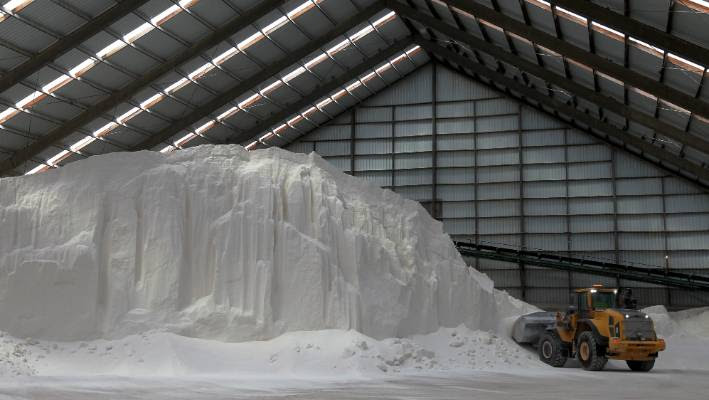Stuff New Zealand
Fertiliser giant Ballance Agri-Nutrients is seeking a High Court injunction against a competitor who claims his product is a more ethical and environmentally friendly alternative to “blood phosphate” from occupied Western Sahara.
Ballance has lodged a claim in the High Court at Auckland seeking a permanent injunction restraining Quin Environmentals from advertising its product as Reactive Phosphate Rock (RPR) – because it alleges the rock is not RPR.
Quin Environmentals managing director Dr Bert Quin said Ballance’s action was a “very cynical ploy to try to block competition in New Zealand”.
Quin imports his rock from Algeria and describes it in advertising as the best RPR in the world.
Quin says studies have proven RPR, a slow-release fertiliser, is far less susceptible to run-off into waterways and leaching into groundwater. And it is in plentiful supply, he says, providing a viable alternative to the phosphate Ballance buys from Western Sahara.
The Saharawi people consider the phosphate to be stolen by Morocco, which annexed their territory in the 1970s.
Ballance and Ravensdown are the only two independent companies in the world buying phosphate from the disputed area and there have been multiple calls for them to stop the trade.
In its statement of claim, Ballance says that under the Fertmark code of practice for the sale of fertiliser in New Zealand, for a phosphate rock to be defined as RPR, a minimum 30 per cent of the declared total phosphorus must be soluble in 2 per cent citric acid.
SUPPLIED
A topdressing plane applies RPR fertiliser in Marlborough. File photo.
The company says its testing of the Algerian phosphate deposit showed results below 30 per cent.
A Ballance spokesman told Stuff the company took the court action to protect farmers’ interests by stopping misleading claims by Quin Environmentals.
“Farmers expect marketing claims to be accurate – they need to know they are getting what they pay for – in terms of nutrients and agronomic performance.”
The spokesman said Ballance had asked Quin to correct the claims.
TOM LEE/STUFF
Bert Quin finds himself in a court battle with fertiliser giant Ballance Agri-Nutrients.
“He has rebuffed multiple requests over the past two months to correct or address this issue, so the court action is really a last-resort option that we have had to take to look after farmers – with our co-operative built around the foundation of robust, proven science.”
Quin said the Algerian product was accepted internationally as one of the best RPRs in the world.
“In my view, it is the best. The foremost authority on the use of phosphate rocks as a fertiliser describe it as a highly reactive phosphate rock. The Food and Agriculture Organization also rank it in the highest reactivity group.”
Quin said the citric solubility test used by Fertmark was outdated and not used anywhere else in the world.
“Certainly some samples, if they contain more than 5 per cent free dolomite, do not reach the NZ test’s 30 per cent citric solubility minimum. However, this is an artefact that has no effect on the RPR’s effectiveness in the field,” he said.
“Fertmark themselves accept that the test is outmoded, and have been waiting for a decade for the industry duopoly to come up with an alternative.”
Quin said Fertmark had no legal standing. “But Federated Farmers support it as a form of quality assurance. Unfortunately, the current test is like trying to assess the acceleration of a car from its shape alone; it is just totally inadequate.”
Quin said to “keep the peace”, he was willing to remove enough of the dolomite from the RPR to produce a version called ‘V2’, which did meet the test, until a new test was introduced.
He said there were several far superior alternatives in use overseas.
“However, it is obvious that Ballance just want me and RPR gone forever, so they can continue to sell maximum quantities of polluting superphosphate made from Boucraa ‘blood-phosphate’ from the occupied Western Sahara, and to hell with anyone else.”
“Is this what their farmer shareholders want and deserve? I think not.”
Ballance says in its statement of claim that the Fertmark testing process for RPR fertilisers is well known and widely accepted within the New Zealand farming industry.
It claims the testing system Quin is using appears to test a sample once it has been ground up, rather than on an “as received basis” as required by Fertmark.
”This is likely to produce an inaccurate and disproportionately high result of the level of phosphorus available in the product.”










